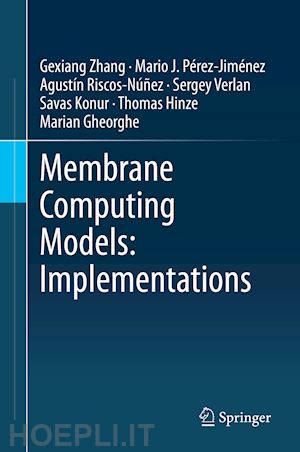

Questo prodotto usufruisce delle SPEDIZIONI GRATIS
selezionando l'opzione Corriere Veloce in fase di ordine.
Pagabile anche con Carta della cultura giovani e del merito, 18App Bonus Cultura e Carta del Docente
Chapter 1 Introduction.- Chapter 2 P systems Implementation on P-Lingua framework.- Chapter 3 Software implementation for P systems.- Chapter 4 Infobiotics Workbench - In Silico Software Suite for Computational Biology.- Chapter 5 Molecular Physics and Chemistry in Membranes: The Java Environment for Nature-inspired Approaches (JENA).- Chapter 6 P systems Implementation on CUDA.-Chapter 7 P systems Implementation on FPGA.- Chapter 8 Hardware implementations and applications.
Gexiang Zhang
Professor at School of Control Engineering at Chengdu University of Information Technology, Chengdu, China. The President of the International Membrane Computing Society (IMCS), IET Fellow, IEEE Senior Member. Managing Editor of Journal of Membrane Computing (Springer) and Editorial Board member of International Journal of Parallel, Emergent and Distributed Systems. He is the main investigator of 5 scientific research projects funded by National Natural Science Foundation of China and of more than 20 scientific research projects at the national and provincial levels. He is the winner of the Grigore Moisil Prize of the Romanian Academy in 2019 and was awarded Sichuan Provincial Natural Science Award or Science and Technology Progress Awards in three consecutive years 2017-2019. Research areas include membrane computing, artificial intelligence, robotics, power systems, and their interactions. Author/co-author of more than 200 publications, two monographs, and (lead) guest editor/co-editor of more than 10 volumes/proceedings. He has more than 3800 citations with an H index of 34, according to Google Scholar.
Mario J. Pérez-Jiménez
Full Professor at the Department of Computer Science and Artificial Intelligence at Universidad de Sevilla, Spain, since 2009, and currently Emeritus Professor. From 2005 to 2007 he was a Guest Professor of the Huazhong University of Science and Technology, Wuhan, China. He is a numerary member of the Academia Europaea (The Academy of Europe) in the Section of Informatics. His main research interests include theory of computation, computational complexity theory, natural computing (DNA computing and membrane computing), bioinformatics and computational modelling for complex systems. He has published 19 books in computer science and mathematics, and over 300 scientific papers in international journals (collaborating with researchers worldwide) and he is a member of the Editorial Board of six ISI journals. He has been the first scientist awarded with “Important Contributions to Membrane Computing” under the auspices of the European Molecular Computing Consortium, Edinburgh, 2008. In 2014, he received the University of Sevilla’s FAMA award for his outstanding research career. He has been the main researcher in various European, Asian, Spanish and Andalusian research grants. From 2003 he is an expert reviewer of the Prospective and Evaluation National Agency of Spain. From May 2006 he is an European Science Foundation peer reviewer, from July 2008 he is an expert reviewer from the Romanian National University Research Council and from October 2015 he is an international expert from the Russian Science Foundation, invited by the Russian International Affairs Council.
Agustín Riscos-Nuñez
Associate professor at the Department of Computer Science and Artificial Intelligence, guarantor researcher at the Smart Computer systems Research and Engineering Lab (SCORE), head of the Research Group on Natural Computing, founding member and Secretary of the Research Institute of Computer Engineering (I3US) at Universidad de Sevilla, Spain. Member of the Steering committee and the Program committee of the “International Conference on Membrane Computing” and the “Asian Conference on Membrane Computing”. Founding member of the “International Membrane Computing Society (IMCS)”, IEEE Member.
His main areas of expertise are bio-inspired computing and artificial intelligence. His research interests mainly focus in computational modelling of complex systems and population dynamics, as well as other practical applications in the fields of bioinformatics, biomedicine, high performance computing and robotics. Co-author of more than 30 papers on relevant international journals and several book chapters, more than 30 contributions to international conferences (several times as invited speaker), and co-editor for more than 10 volumes/proceedings.
Sergey Verlan
Associate Professor at the Department of Computer Science at the University of Paris Est Créteil, France, member of the International Conference on Membrane Computing steering committee, and member of the International Membrane Computing Society (IMCS). His research interests cover several topics, including membrane computing, natural/DNA computing, unconventional computing, formal language theory, study of complex dynamic systems, FPGA digital circuit design and applications in biological modeling and robotics. He has more than 100 publications, including 6 edited volumes of conference proceedings and special issues and more than 1400 citations, according to Google Scholar.
Savas Konur
Reader in Computer Science at University of Bradford. A committee member of IMCS, fellow of UK HEA,











Il sito utilizza cookie ed altri strumenti di tracciamento che raccolgono informazioni dal dispositivo dell’utente. Oltre ai cookie tecnici ed analitici aggregati, strettamente necessari per il funzionamento di questo sito web, previo consenso dell’utente possono essere installati cookie di profilazione e marketing e cookie dei social media. Cliccando su “Accetto tutti i cookie” saranno attivate tutte le categorie di cookie. Per accettare solo deterninate categorie di cookie, cliccare invece su “Impostazioni cookie”. Chiudendo il banner o continuando a navigare saranno installati solo cookie tecnici. Per maggiori dettagli, consultare la Cookie Policy.